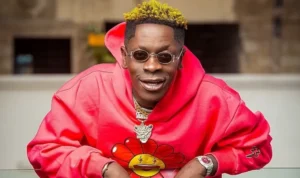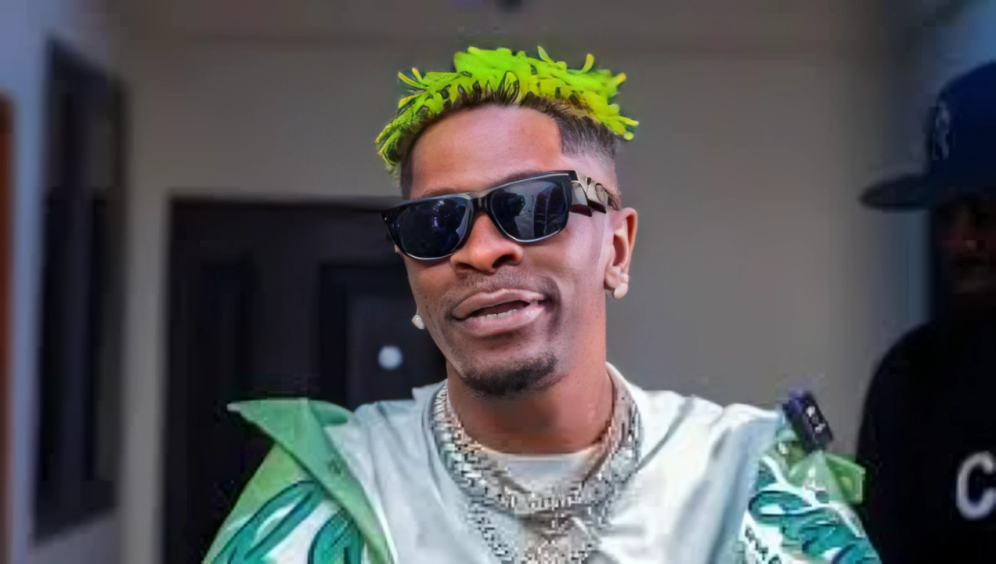“Stop Playing With My Numbers” – Shatta Wale EXPLODES Over Fake Video Views & Industry Manipulation
Ever watched a YouTube video with millions of views but wondered if those numbers were REAL? Well, Ghana’s self-proclaimed Dancehall King, Shatta Wale, just dropped some serious truth bombs about the music industry’s dirty little secret – fake streaming numbers! The controversial artist recently went on an epic rant, calling out people who pressure him to drop new videos while feeding him “nonsense numbers” that don’t translate to real success or money in his pocket.
This isn’t just another celebrity meltdown on social media. Shatta Wale’s frustration touches on something way deeper – the broken relationship between digital metrics & actual artist compensation. When you see a music video with 50 million views, you’d think the artist is swimming in cash, right? WRONG! The reality is much more complicated, especially for African artists trying to make it in the global music scene.

In this deep dive, we’re going to explore why Shatta Wale is so angry about these “fake” numbers, how the streaming economy really works, & what this means for artists across Africa. We’ll also look at the pressure artists face to constantly create content, even when the financial returns don’t match the hype. Get ready for some eye-opening truths about the music industry that might change how you view those view counts forever!
The REAL Problem Behind Shatta Wale’s Outburst
When Shatta Wale screams about “nonsense numbers,” he’s talking about something that affects thousands of artists worldwide – the gap between digital metrics & real money. You see, getting millions of views on YouTube sounds amazing, but here’s the kicker: African artists often earn way less per view compared to their American or European counterparts. The payment rates vary drastically based on the viewer’s location, & guess what? Most of Shatta Wale’s views come from regions where YouTube pays PENNIES per thousand views.
Let’s break this down with some real talk. While an American artist might earn $3-5 per thousand views, an African artist could be looking at just $0.50-1.50 for the same number. That means Shatta Wale could have a video with 10 million views & still struggle to recoup the money he spent on production, marketing, & promotion. No wonder he’s frustrated when people keep asking him to drop new content without understanding the financial reality!
The situation gets even MORE complicated when you factor in fake views & bot traffic. Some industry players inflate numbers using artificial means to make artists look more successful than they actually are. These inflated metrics create a false sense of achievement & can mislead both the artist & their fans about the real impact of their work. Shatta Wale has been in the game long enough to spot these red flags, & he’s not staying quiet about it anymore.
Industry PRESSURE & The Content Creation Trap
Picture this: you’re constantly being told to create new content, drop new videos, & stay relevant in the fast-moving digital world. But every time you spend your hard-earned money on production, the returns don’t match the investment. That’s exactly the trap Shatta Wale is talking about, & it’s driving him CRAZY! The pressure to constantly produce content has become overwhelming for many artists, especially in an era where attention spans are shorter than ever.
Social media has created this weird expectation that artists should be releasing new material every few weeks. Fans, industry executives, & even fellow artists keep pushing for more content without considering the financial & creative toll it takes. Shatta Wale’s outburst highlights how this constant demand for new material can become toxic, especially when the promised rewards don’t materialize.
The “drop a video” culture has also created unrealistic expectations about overnight success. People see one viral video & assume the artist is set for life, not realizing that viral moments rarely translate to sustainable income. Many African artists find themselves caught in this cycle – spending money they don’t have to create content that might bring in views but not necessarily cash. Shatta Wale is essentially saying, “Stop asking me to go broke for your entertainment!”
What makes this even more frustrating is how the industry often uses these inflated numbers to justify LOW payments to artists. Record labels & streaming platforms point to view counts as proof of success while offering minimal compensation. It’s like being told you’re rich because people look at your picture, even though your bank account tells a different story.
The Economics of African Music Streaming
Let’s get into the nitty-gritty of why Shatta Wale’s concerns are so valid. The global streaming economy is heavily skewed against artists from developing countries, & Africa bears the brunt of this inequality. When you stream a song on Spotify, Apple Music, or watch a video on YouTube, the payment per play depends largely on where the listener is located & their subscription status.
For African artists like Shatta Wale, this creates a MASSIVE disadvantage. Most of their core audience is located in countries where streaming payouts are significantly lower. A single stream from a premium subscriber in the US might be worth 10 times more than a stream from a free user in Ghana. This economic disparity means African artists need exponentially more streams to earn the same amount as their Western counterparts.
The situation becomes even more complex when you consider production costs. Creating a high-quality music video in Ghana might cost the same as producing one in Los Angeles, but the potential revenue from that content is dramatically different. Shatta Wale could spend $50,000 on a video production & struggle to earn that money back through streaming, while an American artist with similar production costs could recoup their investment much faster.
YouTube’s Partner Program also has different monetization rates across regions. African content creators often complain about lower CPM (Cost Per Mille) rates, meaning they earn less money per thousand ad impressions. This creates a vicious cycle where African artists need MORE views to earn less money, making the pressure to constantly create content even more intense.
Fighting Back Against The System
Shatta Wale’s public outcry isn’t just venting – it’s a call for CHANGE in how the industry values African artists. By speaking out against “nonsense numbers,” he’s challenging the entire system that prioritizes vanity metrics over real artist welfare. His frustration represents thousands of African creators who feel exploited by platforms & industry players who benefit from their content without providing fair compensation.
The Ghanaian superstar has always been known for his controversial statements, but this time he’s tackling a systemic issue that affects the entire African music ecosystem. His willingness to call out fake numbers & demand transparency could inspire other artists to question the metrics they’re being fed. When someone with Shatta Wale’s influence speaks up, it forces the industry to pay attention.
Some artists are starting to explore alternative revenue streams that don’t rely heavily on streaming numbers. Live performances, merchandise sales, brand partnerships, & direct fan support through platforms like Patreon are becoming increasingly important for African artists. Shatta Wale himself has been diversifying his income sources, which gives him the freedom to speak truth to power without worrying about industry backlash.

The fight against fake metrics also extends to demanding better deals from streaming platforms. African artists are beginning to organize & advocate for more equitable payment structures that don’t penalize them based on their audience’s geographical location. This movement could lead to significant changes in how streaming royalties are calculated & distributed globally.
What This Means For Fans & The Future
So what does Shatta Wale’s rant mean for music fans & the future of African music? First off, it’s a wake-up call for fans to look beyond the numbers when supporting their favorite artists. Those millions of views might not be putting food on your favorite artist’s table, so consider buying merchandise, attending concerts, or supporting them through other means.
The conversation also highlights the need for more transparency in the music industry. Fans deserve to know how streaming platforms calculate payments & why their support might not be reaching the artists they love. Shatta Wale’s honesty about the financial realities of content creation could lead to more open discussions about artist compensation & fair pay.
For upcoming artists, this situation serves as an important lesson about managing expectations & understanding the business side of music. Creating viral content is great, but building sustainable revenue streams is MORE important for long-term success. Young artists should diversify their income & not rely solely on streaming revenue to support their careers.
The industry itself might be forced to address these disparities if more artists follow Shatta Wale’s lead & speak out. Streaming platforms could face pressure to create more equitable payment systems, & record labels might need to be more transparent about how they calculate & distribute royalties to their artists.
Shatta Wale’s explosive comments about fake numbers & industry pressure have opened up a crucial conversation about the real economics of music streaming in Africa. His frustration isn’t just about personal grievances – it represents the struggles of countless African artists who find themselves trapped between the demand for constant content creation & the harsh financial realities of the streaming economy.
The gap between digital metrics & actual artist compensation is a problem that extends far beyond Ghana’s borders. Artists worldwide are grappling with similar issues, but African creators face additional challenges due to regional payment disparities & lower advertising rates. When Shatta Wale calls out these “nonsense numbers,” he’s essentially fighting for the entire African music industry.
Moving forward, fans can play a crucial role by supporting artists through multiple channels, not just streaming their music. Buy concert tickets, purchase merchandise, & share their content organically. Artists like Shatta Wale need our support to continue creating the music we love while fighting for fair treatment in an industry that often undervalues their contributions.
The music industry must also take responsibility for creating more transparent & equitable systems. Streaming platforms should work toward reducing regional payment disparities, & industry players should stop using inflated metrics to justify low artist compensation. Only through honest conversations & systemic changes can we build a music ecosystem that truly serves the artists who make it all possible.
